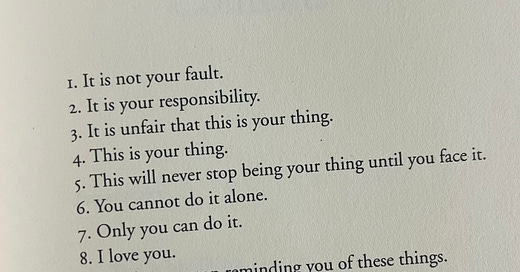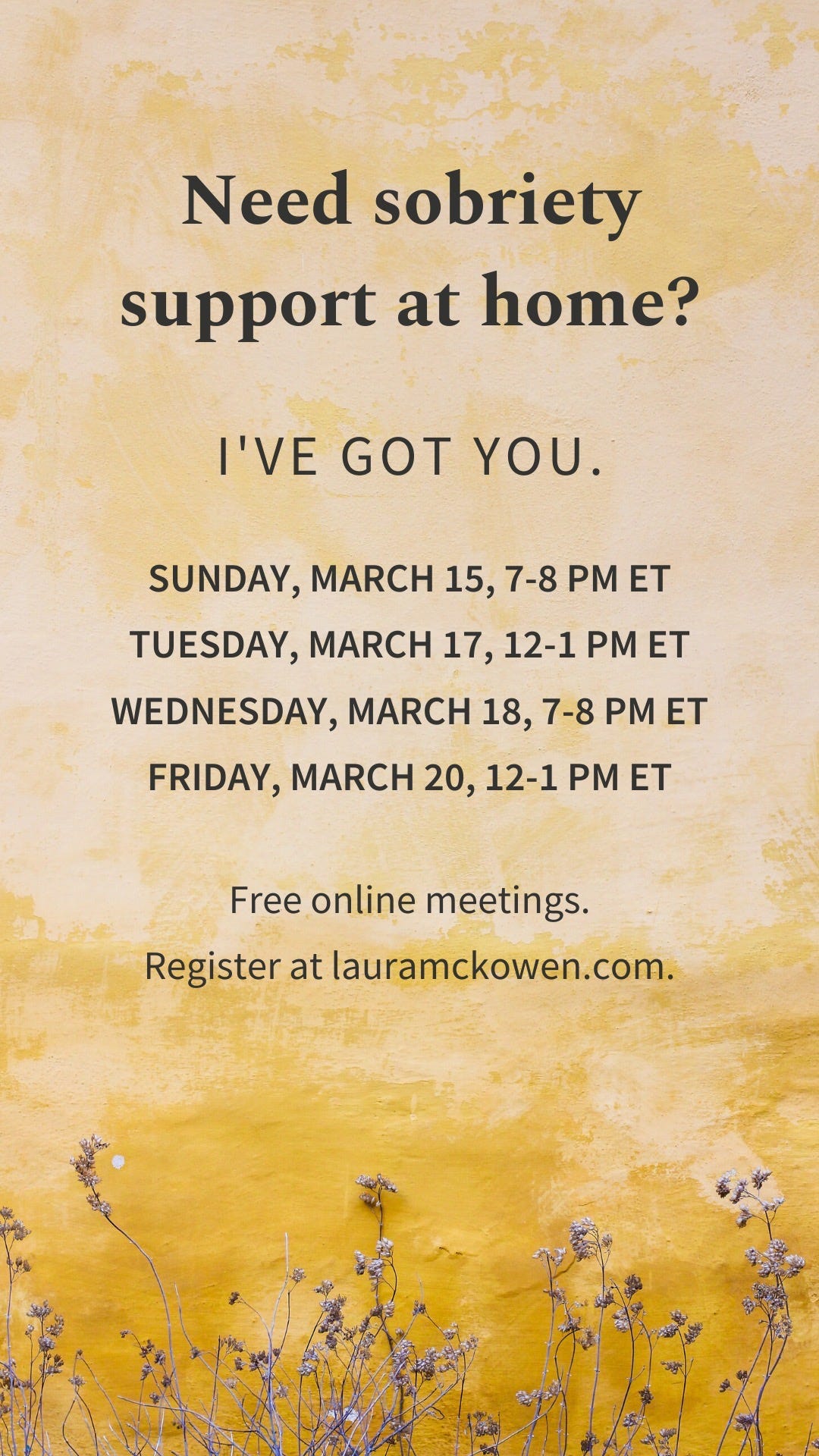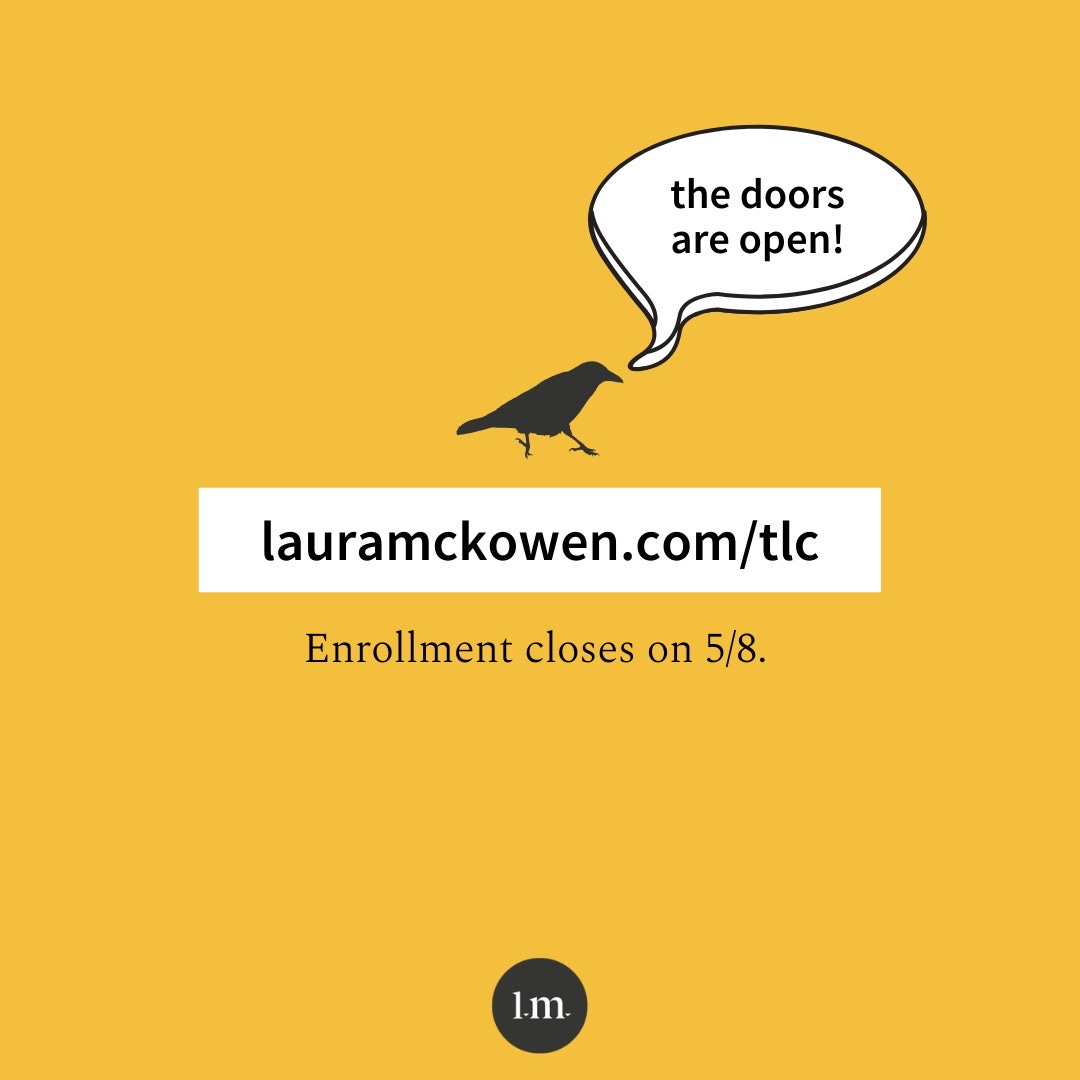When WATL was published in January 2020, I was positive my second book would be another memoir about what I call my Second Sobriety: recovering from love addiction (still hate that term), codependency, attachment issues, and all that really super fun stuff in romantic relationships. For me, and I’ve learned for many, this was “the thing beneath the thing” of my addiction.
My agent was on board, and that was the plan. Then the pandemic hit.
But first, let’s go back to 2016 when I received an email from a woman whose sister was struggling with alcohol. The woman who wrote me had been going through the typical emotional meat grinder of loving someone caught in addiction: She was exhausted, heartbroken, frustrated, hopeful at times, and hopeless at others. Her sister had started pulling away and slipping into dark territory. She didn’t know what to say, so she asked me: What would you have wanted to hear?
I was just shy of two years sober then. The woman contacted me because I’d been sharing my battle with addiction and fight to get sober on my blog, HOME podcast, and on social media. I had somehow, and barely, climbed out from the dark place her sister was in. I wrote her a long response and at the end of my letter, I told her that if all of my words were too much, she could just use a list, my list. I wrote the nine most important things1 I had needed to hear—from myself, from others, from what I understood to be God—when I was in the dark hell of my addiction. They were the things I still needed to hear daily in sobriety.
1. It is not your fault.
2. It is your responsibility.
3. It is unfair that this is your thing.
4. This is your thing.
5. This will never stop being your thing until you face it.
6. You can’t do it alone.
7. Only you can do it.
8. I love you.
9. I will never stop reminding you of these things.
I was in the middle of traveling around the U.S. promoting WATL when lockdowns began. I canceled my plans and watched alongside the rest of the world as all our institutions shut down: schools, airports, churches, banks, and restaurants. Each of these closures seemed more surreal than the last, but I was shocked when I saw an email from my local AA chapter announcing they would be closing the building until further notice. I’d never seen this happen before. Although I wasn’t much involved with AA at that point, the availability and steadiness of meetings were still a comfort to me; any day of the week, there were multiple available. It was a place I knew I could go, but also somewhere I could send others.
While I felt strong and supported in my own sobriety at that point, I thought of all the people who were newly sober or struggling and depended on those meetings to stay sober; those who would understandably relapse given this crisis and would have no place to go; those who would no doubt start drinking more heavily under the pressure of lockdowns and find themselves suffering alone.
Because I’d already built a decent-sized community around sobriety through my writing in the years prior, I felt I could do something to help, at least until things returned to normal. Without thinking about it too much, I decided one Saturday morning in mid-March to host a couple of free online sobriety support meetings over the weekend. I put together a simple sign-up page where people could register to be sent the Zoom information, announced it on social media, and broadcasted it to my newsletter list. I cobbled together a loose format based on what I liked best about AA meetings and also added my own elements: meditation, reading poetry or passages from books, and occasional feedback and commentary on shares. On Sunday, March 15, I hosted the first meeting.
More than one hundred people showed up, and there was this palpable sense of relief that we could be together. Most miraculous to me in those first meetings was how varied the attendees were. There were people who’d never been to any kind of sobriety support meeting (because they’d never been part of AA or something similar), longtime AA members who were curious to try something different, people in long-term sobriety, and many who were still trying to get a start; there were sober-curious folks who were just starting to wonder about their drinking and people who had been sober for years but found themselves on shaky ground because of lockdowns. So many people who’d never before experienced community in their sobriety remarked that they were blown away that something like this was possible when they’d been going it alone for so long. I’d had a strong, solid sober circle for many years at that point, and I’d forgotten how impossible and lonely it was without one.
Before that first week of meetings ended, I created a schedule for the coming week. I hosted two meetings every day—one in the morning and one at night—thinking it would be a temporary thing until stay-at-home orders were lifted. I started asking people I knew in the recovery community to speak at some of the meetings. As the days went on, the word spread, and we started to see 200, 300, 400 people show up at the meetings from as far away as Yemen, Singapore, and Australia.
As I approached the fifth week of running twice-daily meetings, COVID cases continued to climb, and it became more and more clear that lockdowns were not temporary. While I didn’t necessarily want to stop running the meetings, it was becoming more than I could handle alone while trying to navigate co-parenting, my new role as a homeschool teacher, working, and the rest of the fucking pandemic. When I announced plans to discontinue the meetings at the end of April, I received hundreds of emails and messages asking if I could find a way to keep them going. After a few phone calls with family and friends and some quick deliberation, I decided to hire support and give it a shot.
In the last week of April 2020, my right-hand woman, Brooke, and I pulled together a team of meeting hosts and the infrastructure to launch The Luckiest Club (TLC). I decided the nine things would be the cornerstone of the community—a mission statement of sorts—and our closing reading at every meeting. (With a couple of tweaks: #8, I love you became You are loved, and #9, I will never stop reminding you of these things became We will never stop reminding you of these things.)
On the evening of May 4, 2020, my colleague Eric hosted the first official TLC meeting. When he read the nine things at the end, it felt like something essential had snapped into place. Quickly, they became the heartbeat of TLC’s culture. Members have even developed a shorthand way of communicating them, like simply typing “#8” (You are loved) into a chat or saying “Number eight” in response to a share.
While the statements themselves are intuitive enough, over time it became clear there was a need for a deeper understanding of each point and how it could actually be applied. What does it mean to take responsibility? How is saying “It’s unfair that this is your thing” helpful? How does one actually find a community so they don’t do have to do this alone?
That’s how the idea for Push Off from Here was born.
My agent and I huddled and agreed this needed to be the next book she convinced me this needed to be the next book, even though I didn’t love the idea of writing a prescriptive, program-type book, mostly because I didn’t feel qualified to do so. Eventually, I got excited about the challenge, and that’s what POFH is: a deep dive into each of the nine things and is intended to be a guide for anyone who is either facing sobriety or already on the path and in need of reminding and encouragement.
I had a lot of…feelings…while writing this book.
Keep reading with a 7-day free trial
Subscribe to Love Story to keep reading this post and get 7 days of free access to the full post archives.







